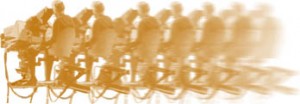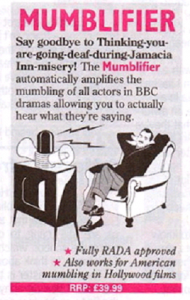This links with Sound Levels circa 1961: the two pages overlap to a lerge extent.
Alasdair Lawrance
"Points of View" Sunday 23rd November 2014 had sound problems as its opener. Usual complaints that have been rehearsed here often enough, re. speech and music levels, background fx etc.
Apparently, some researchers are working on a system that will enable the viewer to adjust the relative levels in the home. It won’t be available for between 2 – 5 years (!), but why should I have to be my own SS? I thought that was part of what I paid for!
Dave Plowman
That’s always the answer. Make it the viewer’s choice therefore the viewer’s fault.
“…You’re listening in ‘stereo’ when you should really be using surround….”. And
But ask the most basic of questions like why the BBC London News following the BBC national news on the same SD channel are frequently – but not always – at very different levels and you get no reply. Ask why the vocal quality also differs so much gets no answer either.
BBC R4 seems able to produce a mixture of programme material throughout the day without me needing to adjust levels between programmes. I’d love to know why basically speech on BBC1 is any different.
Poor sound on a modern production, this time on “Call The Midwife” (2014). Several exteriors where it was difficult to understand the dialogue due to woolly sound from mics under layers of clothing. They were generally short scenes shot wide – so would have been easy to do a wild track using a boom and slot that in at the dub. But perhaps no one bothers with this technique these days.
Bernie Newnham
“Private Eye” has the answer:
(Click on the picture below to see larger version:
use your Browser’s BACK button to return to this page)
Patrick Heigham
Sadly, I don’t think that guys and gals are properly instructed these days.
Here’s another story from my splendid experiences:
From talking to my colleagues currently working in Features, (I moved into Documentary mixing, after a spell as Boom Op in features), it seems to be the tendency to use two cameras on the scene, but NOT cross-shooting on the same size lens, but one wide, one close! This effectively rules out a boom on outside locations, but might just get away with it in a quiet studio, although the perspective will not be right for a closer angle.
Therefore the poor mixer/recordist is forced into personal mics, thinking, maybe that it’s only guide track, but more often gets used when production realise how expensive ADR is, or the artistes are not available later on. There is a great art in hiding/placing personal mics – clothes rustle, visibility etc, and yes there is going to be some muffle factor.
I recall shooting with Glenda Jackson, in Vienna (Jack Gold directing) and they wanted rain! GJ was wearing a splendid open weave woollen scarf – ideal to place the mic under it, but the rain on the material soon made it sodden, and muffled.
I was forever going up and drying off the scarf, squeezing out the moisture, when Glenda remarked that we should have little rain hats for the mics. Forgetting that she once worked behind the counter in Boots I believe, I answered that we did, and bought them in packets of three from the chemist! She retaliated by announcing that "Here am I, taking a great interest in the technicalities, when not only do I get put down, but it’s an obscene put down!"
She was great though, as when the crew came to a screening at BAFTA, in the bar, she advanced upon me, arms wide, saying, “Where’s my hug, then?" Glad I’m out of it all, now, today’s Directors don’t work the way I was taught.
Dave Plowman
If it’s some form of stunt where re-takes are expensive or impossible then that’s understandable. But if a director decides he wants this on a prog which is normally boomed in a straightforward scene, I’d tend to ask if he cares about the sound. And get some help from lighting too – as such techniques can compromise that as well.
Of course these days everything seems to be on personal mics so the answer to that, is no – nobody actually cares much about sound quality any more.
Patrick Heigham
Sure, on "The Man with the Golden Gun" for the car jump stunt there were 6 cameras – 4x 35mm Panavision and my 8mm Bolex! (No dialogue, though).
I believe that, to preserve continuity, many scenes are now photographed wide and close simultaneously, so the cuts can be made as and when.
(So, what happened to the Script Supervisor – formerly Continuity?) Screws up normal boom and perspective. But does the audience appreciative perspective? Directors, today, might say no, they want to hear the dialogue.
Over to you – whoever was responsible for controlling the actors on "Jamaica Inn".
Dave Plowman
And when you see the final edit, the wide is only used in a couple of the usual places – briefly. Screwing up the important part of the scene – the dialogue.
I noticed a couple of bits of reversed perspective on major TV drama productions over the Xmas 2014 period.
I, as a viewer, want to hear the dialogue. This is what I’m complaining about. The director is often too familiar with the dialogue to make an accurate judgment as to what it’s going to sound like at a first viewing, that is, to the public.
Patrick Heigham
Indistinct dialogue has been flagged up by my film guild – The Association of Motion Picture Sound, citing that those people who know the dialogue, from the written page, and rehearsals accept it, but do not always listen to the Production Mixer who is hearing it for the first time.
John Henshall
Speaking of cinema features, this crap sound problem has been around for years. You only have to watch "Singing in the Rain".
Patrick Heigham
I love "Singin’ In The Rain" The sequence of sewing the mic into the corset is so true today!
The camera dept. have never forgiven sound for shutting them into a soundproof closet. I worked on a movie where a very, very young trainee camera dept chap uttered, " Bloody sound dept" I immediately demanded of him, where he had picked that from (for he hadn’t had that experience). He said, “The camera dept.”
I want to establish that in TV, we all worked together – sound and camera – to finish with an end product worthy of transmission, and in the earlier days, live, no chance of re-takes. Film is different, and I have experienced that.
But, then, no BBC trained operator would like to be associated with "crap" sound – would they?
Geoff Fletcher
Yes, film is different. I worked on both dramas shot on film and electronic (TV) cameras as a Unit Production and/or Location Manager. One of the differences I found as an ex TV cameraman was that before the advent of video assist, the camera operator’s word was never questioned – if he wanted to go again on a shot, then it happened. With TV cameras this was generally true for lighting and sound, but all too often if the cameraman wanted to do it again because his development shot was slightly off – enough so that he personally knew it was off – the reply would be that it would be alright after the edit. This was even more true on multi camera OB drama shoots where these decisions became almost a committee affair, with the cameraman’s opinion often given less weight than that of other sections.
I did admire the work of the film sound recordists – shooting on Anglia productions in Norfolk and Suffolk I lost count of the times when just as we were about to roll, the sound recordist would hold up his hand and say "Stop – plane over!" The rest of us could usually hear nothing, but sure enough, a few moments later we would catch up with the SR’s acute hearing as a distant jet from one of the many military airfields would whine across the sky. The other guy I had a lot of time for was the focus puller who worked back then on measurement and experience alone. Most of them were amazingly accurate on an everyday basis and those that weren’t either improved rapidly or else didn’t last long. I actually preferred working on film rather than on tape. Ah – happy days!
As regards sound and cameras working together on BBC TV crews – I always found that the happiest crews to be on were those where this was the norm. I was lucky – all the five crews I was with for any length of time during my years at the BBC fell into this category. When on one of the pools, you might find yourself attached to one of the few crews where this was not so – indeed I once spent a miserable three days working with one crew where there appeared to be a state of continuous open warfare between the boom ops and the cameramen – (no numbers, no pack drill). My first crew was Reg Poulter’s Crew 4 and I was taught from the outset that we were all together as one and helped each other out – if there was a big mic rig, then after the cameras and cables were away you were expected to pitch in and help the sound crew; if a boom mic was in danger of being in shot than you gave the boom op a heads up; if the boom op was in danger of running out of rack and you could give him a foot more room, then you did so; etc. etc. All simple stuff, but so valuable in fostering an appreciation of other crew members skills and problems, and all helping to produce a professional end product.
Albert Barber
Two words come to mind when talking about crews both TV and Film.
-
Respect and
-
Knowledge
The production team that hasn’t these will find the respect of one with the other in short supply.
Many Producers and Directors now do not have the knowledge to understand the crews that they are working with. New Producers that respect their teams can acquire knowledge as they “grow up” by listening to their crew.
Executive producers who maybe were Producers for a very short time or were dealing with costing rather than production are often ignorant of much that goes on. The recent Sony withdrawal of a feature film does illustrate the divide between those that make films or Television programmes to make money and those to use money to make films.
John Howell
If the BBC is looking at revenue from the sale of programmes to other countries they will still have to produce a full mix. This will probably be available to the viewer who doesn’t care about DIY Sound Mixing; most won’t, so the idea will sink just like 3D TV.
If it does succeed the disagreement about the ‘right’ balance will land in the lap of ‘family viewing’, you know the sort of thing, Gran can’t hear the dialogue because teenage rebel likes the incidental music.




